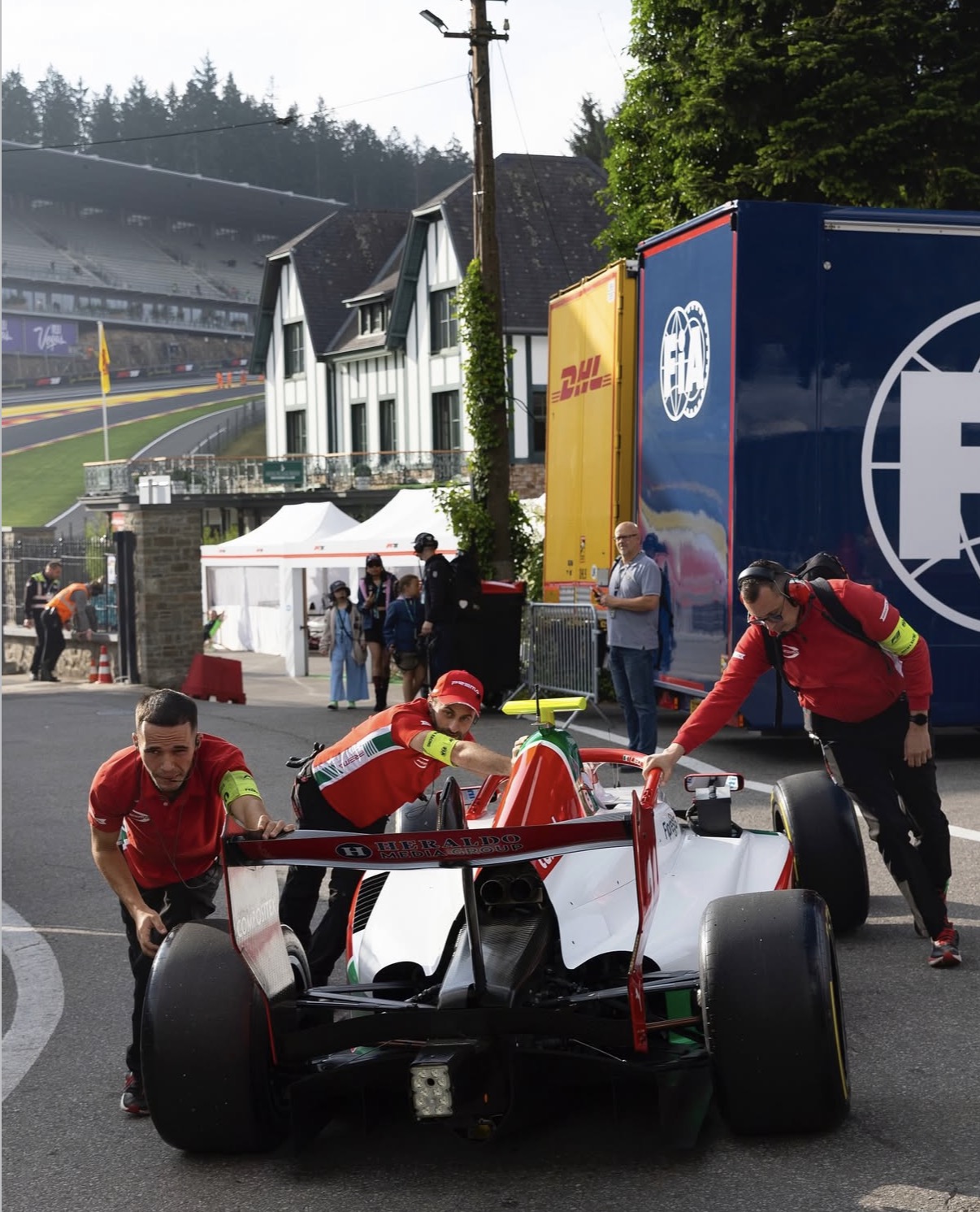Amid a backdrop of allegations involving Red Bull team principal Christian Horner and the suspension of a female employee who accused him of inappropriate behaviour, F1 TV presenter Laura Winter stands as a beacon of resilience and defiance.
On International Women’s Day, from the paddock of Saudi Arabia, Winter articulated the sentiments of countless women in motorsport.
“It is International Women’s Day – after recent news stories and headlines, it has not been easy to be a woman working in Formula 1,” she shared, touching on the personal and professional hurdles faced by women in the industry.
The case involving the female Red Bull employee, suspended on the eve of a day meant to celebrate women’s achievements, casts a long shadow. Yet, Winter’s words shine brightly, offering hope and solidarity.
“We are here to stay, and we are right where we belong.”
This statement, bold and unwavering, emphasises the determination of women in Formula 1 to overcome obstacles and claim their rightful place in the sport.
Winter, a seasoned broadcaster with F1 since 2019, has been a vocal advocate for women in motorsport. Her journey, marked by personal challenges, including a harrowing experience of violence on International Women’s Day in 2019, epitomises the strength and courage of women striving for equality and respect in a traditionally male-dominated arena. Her resolve is mirrored in the broader push for inclusivity within Formula 1, highlighted by initiatives like the F1 Academy race in Jeddah.
The F1 Academy, an all-female racing series, aligns with the Formula 1 calendar, showcasing emerging female talent and breaking new ground in a sport striving towards diversity. Mercedes junior Doirane Pin’s victory in the season’s opening race is a testament to the changing tides in motorsport, celebrating female achievements on the track.
Hosting the inaugural round of the F1 Academy in Saudi Arabia, a nation where women’s right to drive was recognised only in 2018, symbolises the global shift towards gender equality. It’s a poignant reminder of the progress being made and the battles still to be fought.
The resolve of women in Formula 1, supported by allies within the sport, promises a future where gender equality is not just an aspiration but a reality. Lewis Hamilton expressed his disappointment with the current situation in the sport as controversy continues to reign within the FIA and Red Bull Racing.
“We are at a crucial point where the actions we take define us. The lack of transparency and accountability is concerning,” Hamilton stated, calling for a shift in the sport’s approach to such matters.
As the Formula 1 community grapples with these issues, Winter’s voice, and those of other women in the sport, embody a powerful call to action. They remind us that the fight for equality is far from over, but with determination, progress is within reach.
The controversy surrounding Horner and the inadequate response from the top names in F1 and the FIA highlight the sport’s need to confront sexism, discrimination, and abuse of power.
Despite the severity of these allegations, the response from both the FIA and Red Bull has been notably lacking in substance, with neither organisation committing to measures aimed at supporting women, non-binary, and trans workers amidst these disturbing revelations.
The absence of a concrete response from these entities is not merely disappointing; it represents a significant oversight in addressing the structural inequalities that permeate the sport.
Nicole Sievers, co-founder of Two Girls 1 Formula, highlights the complexity of implementing uniform policies within a sport where each team operates under its own governance across various jurisdictions. Nevertheless, Sievers emphasises the unique pressures faced by women working within this male-dominated environment, noting, “In a sport that’s so heavily male-dominated, there are also likely pressures on women that are working for these teams. That’s a really tough position to be in, especially when you do see the overwhelming majority of the ruling class of F1. We’ve seen that play out historically. Money just breeds power, which breeds a loss of a feeling of consequence.”
The demographic composition of the current media pool—predominantly older, male, and white—further exacerbates the issue, with coverage around sexism, racism, and other forms of discrimination not being prioritised. The stringent regulations governing F1 coverage further complicate matters, creating an environment where journalists may hesitate to ask probing questions for fear of losing access.
Lily Herman, author of the F1 culture newsletter Engine Failure, articulates this concern, stating, “There are all these fears that exist in F1 around, ‘Hey, if I speak up, I’m going to get my media access revoked or my entire media organization will if I do something wrong.’”
This restrictive atmosphere was notably exemplified by the incident involving Road & Track’s editor-in-chief, Daniel Pund, who removed a critical piece by Kate Wagner on the opulence of Formula 1. It raised questions about the influence of the FIA, though Pund has stated that the organisation did not reach out to him.The way these issues are ultimately addressed will serve as a testament to Formula 1’s acknowledgment of its evolving fan base and its commitment to creating a supportive environment for its employees.
Lewis Hamilton, Mercedes driver and seven-time world champion, reflected on the situation, expressing disappointment, and emphasising the significance of this moment for the sport in terms of its public image and internal culture.
As Formula 1 confronts these challenges, the voices of fans and stakeholders calling for accountability, equal treatment, and safety protections grow louder. F1 fan Alicia Schäfer described the revelations about Christian Horner’s alleged inappropriate behaviour as ”a punch in the stomach”. Schäfer’s comments highlight a broader disillusionment among fans, particularly women, who have seen the sport’s recent inclusivity efforts overshadowed by these allegations.
“Hearing dismissive remarks from other teams and drivers only exacerbates the feeling of being sidelined in a sport we deeply love,” Schäfer lamented, calling for a more responsive and responsible stance from the Formula 1 community.
The establishment of initiatives like the F1 Academy, aimed at increasing opportunities for female drivers, represents a step in the right direction, yet it is imperative that such efforts extend beyond mere tokenism.
In wrapping up, this ongoing situation in Formula 1 highlights a vital lesson: the importance of valuing people’s well-being above winning races. It seems like the higher-ups at Red Bull, Formula One, Liberty Media and the FIA think staying quiet will make all their problems disappear. They might hope the noises of the racing on track drowns out the calls for them to be more transparent and responsible for off track discrepancies. It’s as if they believe ignoring a storm warning will stop the rain from pouring. Yet we know, ignoring storms can lead to a heavy flood of truth and accountability.
The sport’s leaders must act decisively to make sure that Formula 1’s legacy is remembered not just for its on-track successes but also for its dedication to fairness, respect, and dignity for everyone involved.





